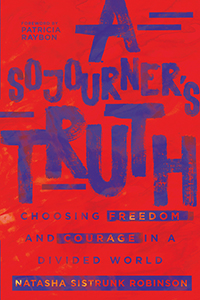Preachers should read good fiction for the insight it offers on the human condition—good, bad and ugly—not just to seek quotes that can be plucked out of context to make points in a sermon, cultural analyst and English professor Greg Garrett told students and faculty at Baylor University’s Truett Theological Seminary.
 Greg Garrett “Great stories may make us more truly human, they may help us behold the divine, and we could preach from and teach from them as works we know personally to be soul-filling. They may allow us to drop breadcrumbs leading back to our tradition,” he said.
Greg Garrett “Great stories may make us more truly human, they may help us behold the divine, and we could preach from and teach from them as works we know personally to be soul-filling. They may allow us to drop breadcrumbs leading back to our tradition,” he said.
Garrett—professor in Baylor’s English department and author of We Get to Carry Each Other: The Gospel According to U2 and One Fine Potion: The Literary Magic of Harry Potter—delivered the W.C. Dobbs Lecture at Truett Seminary on “From Homer to the Hunger Games: Imaginative Reading for Preaching, Teaching and Formation.”
“Some pagan art is edifying; some Christian art is soul-killing,” Garrett said.
Ancient Greek epics by Homer illustrate “that for 3,000 years, people have been looking to story to help them understand themselves, their communities, their world and their relationship with the divine,” he said.
The Hunger Games
That continues in modern fiction, as in the case of Suzanne Collins’ Hunger Games series, as evidenced by social media participants who responded to a recent poll on influential books and said Hunger Games changed their lives, he observed.
“The Hunger Games saga is a powerful meditation on the spiritual costs of violence, a prophetic illustration of the injustice of any society with great gaps between rich and poor, and Collins has a clear sense of the centrality of sacrifice and community,” Garrett said.
Christians—particularly ministers—should read fiction with discernment, whether written by Christians, non-Christians or individuals who do not reveal their faith. The early Church Fathers recognized truth and beauty in non-Christian sources as evidence of God at work in the world, he noted.
Sign up for our weekly edition and get all our headlines in your inbox on Thursdays
“Non-Christian authors and artists share with Christian authors and artists the calling to say something true and to create something beautiful,” Garrett said. “Even though their art may not be informed by a working faith, their work can offer us something powerful and potentially transformational.”
Even non-Christian fiction that reveals unpleasant aspects of humanity can enlighten, he observed.
“Works that reveal the face of evil, or shed light on human venality, or explain our impulse toward violence, or the attraction of any of the false desires that seek to replace God with tiny and imperfect substitutes can be edifying,” he said. “The light can shine powerfully in darkened rooms.”
Citing Augustine, Garrett suggested asking whether a story makes a Christian feel increased love of God or neighbor as a good test to discern whether it merits attention.
Finding narrative wisdom
Preachers should read fiction to find narrative wisdom, not sermon examples, he insisted.
“I don’t care how desperate you are for material—that’s not how we read,” he said. “We need to come to a work without expectations, so far as we are able.
“When we come to a story with our hermeneutical filters firmly in place, we most certainly will find what we expect to find—but we may miss the pearl of great price that should have been our goal. …
“The larger narrative is what we need to pay attention to—not just a conveniently handy phrase or example we can seize and twist in the wind. Just as we do the Bible a disservice to read it in bite-size chunks that conform to what we already believe, we do literature a disservice when we treat it in such a fashion.”
Garrett urged preachers to use the skills they learned in seminary classes on biblical interpretation when they read fiction.
“Use the exegetical tools you’ve been given in this place to place a work in its cultural and literary context. Use the devotional tools you’ve been given to open yourself up to an awareness of delight and beauty. And maybe most important, from a preaching or teaching standpoint, locate the narrative,” he said.
Garrett suggested three archetypal story patterns common to great literature and the Christian tradition that should guide reading:
• Lost and found. From the parable of the Prodigal Son to TV’s “Lost,” from the biblical story of the Exodus to Homer’s Odyssey, a recurring theme centers on the journey to a place of safety and refuge.
“We might condense the spiritual wisdom to be found in this storyline this way: The task of our life is to find our way back home—and to belong there once we arrive,” he said.
• The sacrificial hero. In Homer’s Illiad, Priam risks death to ask for his son’s body. In Hunger Games, Katniss volunteers to take the place of her younger sister in the arena. The Harry Potter stories emphasize numerous sacrificial acts for others—Harry’s parents, Dumbledore, Harry’s friends and eventually Harry himself.
“Nobility of spirit means recognizing that there are things larger than ourselves and our own desires,” he said.
• Living in community. The gathering of warriors in the Iliad, the assembling of King Arthur’s knights of the Round Table and the calling together of the four houses of Hogwarts School in the Harry Potter series all emphasize the importance of community. So does Jesus calling the disciples in the Gospels.
“We are formed by those around us. Community challenges, supports and nurtures us,” Garrett said.
“And this third story brings together all of our stories. When we find community, we come home; we are challenged to love and serve; we become our very best selves.”














We seek to connect God’s story and God’s people around the world. To learn more about God’s story, click here.
Send comments and feedback to Eric Black, our editor. For comments to be published, please specify “letter to the editor.” Maximum length for publication is 300 words.